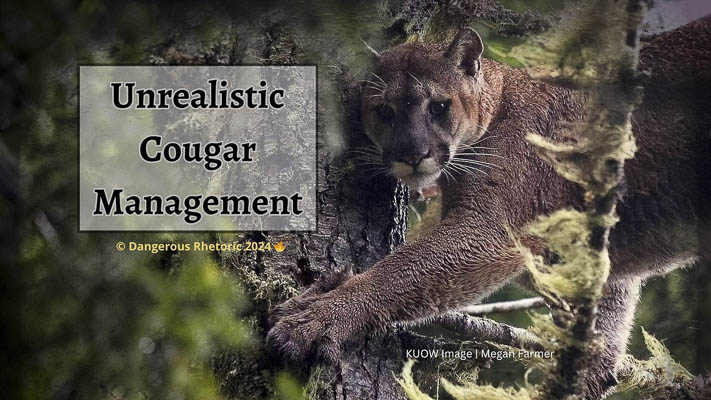
Nancy Churchill discusses the two sides of the topic of cougar conservation in Washington state
Nancy Churchill
Dangerous Rhetoric
Washington state has some remarkable conservation success stories. The recovery of the cougar population is one of those success stories. Facebook groups that post trail camera images of cougar sightings show the beautiful animals are thriving in every corner of Washington, from the most remote areas to highly urban environments.

Like many conservation topics, there are two sides of the issue. Some believe the cougars are on the verge of extinction in Washington and the species needs more protection. Others believe cougars have overpopulated their habitat, leading to increased pressure on ungulate herds and more frequent dangerous encounters between these large predators and people. Certainly, we need a population of the beautiful predators, but we also need to management that prioritizes public safety. A robust and open debate about the management of these beautiful but dangerous animals is part of this process.
The Washington Fish and Wildlife Commission
The Fish and Wildlife Commission consists of nine governor-appointed members who serve six-year terms. The commission establishes policies to protect wildlife and ecosystems while providing sustainable fish and wildlife recreational and commercial opportunities and maintaining healthy and diverse fish and wildlife populations.
The commission has approved a petition that requested a review of the cougar hunting seasons. The petition, put forward by the Mountain Lion Foundation and affiliated groups, requests the current rules be revised to more strictly limit the hunting of cougars. The proposed rule language was published on April 30, 2024. Public comment is open until June 21, and a vote is expected in July.
According to Rep. Joel Kretz (R-Wauconda) in his recent newsletter, “They (the commissioners) have directed the Department of Fish and Wildlife (WDFW) to adopt more stringent rules on cougar hunting seasons and cap the number of cougars taken by hunters.
“The commission, whose members are appointed by the governor, are once again going against WDFW’s own scientific recommendations and direction from wildlife officers who are on the front lines. These are the men and women who, more often than not, are the ones called to dispatch a problem cougar that has killed livestock or pets, or has found itself in the backyard of a residence.”
Kretz continued, “I wrote an op-ed in The Spokesman-Review a few years ago addressing the cougar problem we’re seeing in northeast Washington. When I asked the department for the number of problem cougar kills by WDFW officers in 2015, that number was 26. In 2019 that number was 105!”
An unrealistic approach
Kretz believes that the 2024 proposed limits are “an unrealistic approach to cougar management. Once again, the ideology of those who live surrounded by steel and concrete, are trying to assuage their own guilt by demanding that we change. Us. The ones who live and cohabitate with cougars and wolves.”
In the documentation that supported the current (2022) hunting regulations, the WDFW noted that “WDFW strives to manage for viable and productive elk populations with desirable population characteristics, as explained in WDFW’s 2015-2021 Game Management Plan. A recent risk-assessment conducted by WDFW has
identified cougar predation as a leading cause of elk calf mortality. WDFW recognizes cougar management actions, which aim to reduce cougar numbers in specific areas, as a viable management tool to minimize potential predation on ungulates and provide support to the ungulate herd.”
Fearless and aggressive
Unfortunately, cougars hunt more than deer and elk. And after hound hunting was banned in Washington, cougars have gradually lost their fear of humans. As a neighbor once shared with me, there is nothing quite as chilling as looking under your deck for your lost dog, only to see a cougar peering back at you, the dog lifeless in its claws. Thank goodness it was “just a dog”, and not a person.
All over the state, we have seen a gradual increase in cougar-human conflict. From the Olympics in 2023, we have a documented cougar attack on an eight-year-old child, and from Eastern Washington in 2022, an attack on a nine-year-old child. And from urban King County, there is the story from March of 2024 titled “A cougar attacked them. They fought back for 45 harrowing minutes.” The aggressive cougar in this most recent story was a young cat in good condition and without rabies. It had no fear of the group of women on bikes!
Those of us who live on the wilderness frontier love our wild neighbors, but we also should have the right to protect ourselves and our community when the wildlife lose their proper fear of people and choose the easy pickings that can be found near humans. Limiting the ability of wildlife managers to remove problem cats will lead to more conflict and more dangerous encounters.
You CAN Influence the commission
Today, I echo the call to action from Rep. Kretz: “The commission will hold a public hearing on the new rules during their meeting in Vancouver on June 21 and 22. They will be taking public comment electronically until then.” Submit your comments at the page for the “2024 Annual Cougar Season Setting Proposal CR102.”
Take five minutes to let the commissioners know you oppose the proposed rule changes, and that wildlife managers should be able to continue to follow the existing rules for the responsible management of Washington’s cougars.
Nancy Churchill is a writer and educator in rural eastern Washington state, and the state committeewoman for the Ferry County Republican Party. She may be reached at DangerousRhetoric@pm.me. The opinions expressed in Dangerous Rhetoric are her own. Dangerous Rhetoric is available on thinkspot, Rumble and Substack.
Also read:
- POLL: Should Washington Raise the 1% Cap on Property Tax Increases?Clark County Today’s weekly poll asks whether Washington lawmakers should raise the current 1% cap on annual property tax increases.
- Letter: The more you knowCamas resident Anna Miller criticizes a recent remark by Rep. Jasmine Crockett as racist and demeaning, and outlines Republican contributions to civil rights history in her letter to the editor.
- Letter: City vehicles speeding on the highwaysVancouver resident Peter Bracchi raises concerns about excessive speeding by city-owned vehicles, based on GPS data received through a FOIA request.
- Opinion: The stage is set for a battle royaleRep. John Ley outlines key legislative battles in Olympia, raising concerns about tax hikes, tolling, and spending priorities in Washington state.
- Opinion: Olympia’s budget blowout – The taxpayer gets the billNancy Churchill says Washington’s $78.5 billion state budget signals runaway government growth and demands urgent taxpayer pushback.










